
Roscoe Conkling "Fatty" Arbuckle was an American silent film actor, comedian, director, and screenwriter. He started at the Selig Polyscope Company and eventually moved to Keystone Studios, where he worked with Mabel Normand and Harold Lloyd as well as with his nephew, Al St. John. He also mentored Charlie Chaplin, Monty Banks and Bob Hope, and brought vaudeville star Buster Keaton into the movie business. Arbuckle was one of the most popular silent stars of the 1910s and one of the highest-paid actors in Hollywood, signing a contract in 1920 with Paramount Pictures for $14,000.

Tillie's Punctured Romance is a 1914 American silent comedy film directed by Mack Sennett and starring Marie Dressler, Mabel Normand, Charlie Chaplin, and the Keystone Kops. The picture was the only feature-length comedy made by the Keystone Film Company.
Charlie Hall was an English film actor. He is best known as the "Little Nemesis" of Laurel and Hardy. He performed in nearly 50 films with them, making Hall the most frequent supporting actor in the comedy duo's productions.

The Rink, a silent film from 1916, was Charlie Chaplin's eighth film for Mutual Films. The film co-starred Edna Purviance, Eric Campbell, Henry Bergman, and Albert Austin, and is best known for showcasing Chaplin's roller skating skills.

Chester Cooper Conklin was an early American film comedian who started at Keystone Studios as one of Mack Sennett’s Keystone Cops, often paired with Mack Swain. He appeared in a series of films with Mabel Normand and worked closely with Charlie Chaplin, both in silent and sound films.
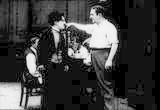
The Masquerader is a 1914 film written and directed by Charlie Chaplin during his time at Keystone Studios. This film stars Chaplin and Roscoe Arbuckle and has a running time of 13 minutes. It is the tenth film directed by Chaplin.

The Knockout is a 1914 American silent comedy film starring Roscoe "Fatty" Arbuckle. It also features Charlie Chaplin in a small role, his seventeenth film for Keystone Studios. It is one of only a few films in which Chaplin's Little Tramp character appears in a secondary role, not appearing until the second half of the film. It also stars Arbuckle's wife, Minta Durfee, Edgar Kennedy and Keystone owner, Mack Sennett in a minor role as a spectator. The film was directed by Charles Avery.
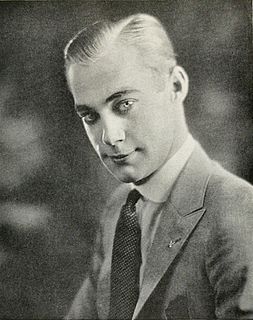
Al St. John was an early American motion-picture comedian. He was a nephew of silent film star Roscoe "Fatty" Arbuckle, with whom he often performed on screen. St. John was employed by Mack Sennett and also worked with many other leading players such as Charlie Chaplin, Buster Keaton and Mabel Normand. His film career successfully transitioned from the silent era into sound, and by the late 1930s and 1940s he was working predominantly in Westerns, often portraying the scruffy comedy-relief character "Fuzzy Q. Jones". Among his notable performances in that role are in the "Billy the Kid" series of films released by the Producers Releasing Corporation from 1940 to 1946 and in that company's "Lone Rider" series from 1941 to 1943.
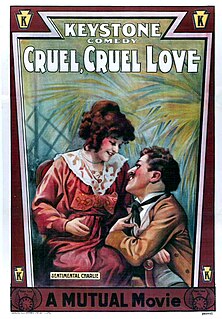
Cruel, Cruel Love is a 1914 American comedy silent film made at the Keystone Studios and starring Charlie Chaplin.

His New Profession is a 1914 American comedy silent film made at the Keystone Studios and starring Charlie Chaplin. The film involves Chaplin taking care of a man in a wheelchair. It is also known as "The Good for Nothing".

Araminta Estelle "Minta" Durfee was an American silent film actress from Los Angeles, California, possibly best known for her role in Mickey (1918).

Caught in a Cabaret is a 1914 short comedy film written and directed by Mabel Normand and starring Normand and Charles Chaplin.

A Film Johnnie is a 1914 American-made motion picture starring Charles Chaplin, Roscoe Arbuckle, and Mabel Normand.

Tango Tangles is a 1914 American film comedy short starring Charles Chaplin and Roscoe Arbuckle. The action takes place in a dance hall, with a drunken Chaplin, Ford Sterling, and the huge, menacing, and acrobatic Arbuckle fighting over a girl. The supporting cast also features Chester Conklin and Minta Durfee. The picture was written, directed and produced by Mack Sennett for Keystone Studios and distributed by Mutual Film Corporation.

His Favourite Pastime is a 1914 American comedy film starring Charlie Chaplin.
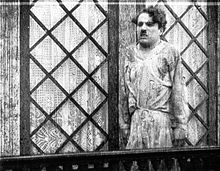
Caught in the Rain is a 1914 American comedy silent film starring Charlie Chaplin. This film was the first of many movies in which Chaplin both directed and played the lead. The short film was produced by Mack Sennett for Keystone Studios with a running time of 16 minutes.

A Noise from the Deep is a 1913 American short silent comedy film starring Mabel Normand and Roscoe "Fatty" Arbuckle. The film was directed and produced by Mack Sennett and also features the Keystone Cops on horseback.
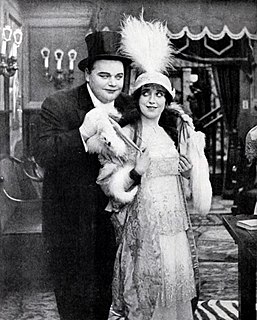
That Little Band of Gold is a 1915 American short comedy film directed by Roscoe "Fatty" Arbuckle and starring Arbuckle, Mabel Normand, and Ford Sterling.

The Rough House is a 1917 American two-reel silent comedy film written by, directed by, and starring both Roscoe "Fatty" Arbuckle and Buster Keaton. The Rough House was Keaton's first film as a director.

Merry Wives of Reno is a 1934 American pre-Code comedy film directed by H. Bruce Humberstone and starring Guy Kibbee, Glenda Farrell, Donald Woods, Margaret Lindsay, Hugh Herbert, Frank McHugh and Ruth Donnelly. The film was released by Warner Bros. on May 12, 1934.




















